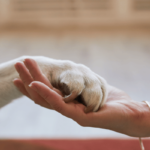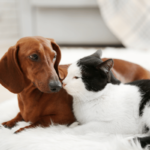Understanding the importance of a Consistent Pet Care Routine is crucial for every pet owner. It’s the foundation for a happy, well-adjusted dog or cat.
Routine’s Role in Pet Behavioral Health

Establishing a consistent pet care routine is vital for your furry friend’s well-being. Just like humans, pets thrive on regularity. This routine encompasses feeding, exercise, playtime, and rest. Consistently following a schedule helps reduce anxiety in pets, as they know what to expect. Moreover, it aids in training, reinforcing good behavior. Importantly, a routine mirrors natural instincts, providing a sense of security and stability.
A well-planned routine also benefits pet owners. It fosters a deeper bond between you and your pet, as regular interactions build trust and understanding. Additionally, it helps in monitoring your pet’s health. Consistent feeding and exercise times make it easier to notice any changes in appetite or energy levels, which are often early signs of health issues. Furthermore, a routine simplifies pet care, making it less overwhelming for busy owners.
Integrating a Consistent Pet Care Routine into your life requires commitment but is incredibly rewarding. Start by setting specific times for meals, walks, and play. Gradually, your pet will adapt to this structure, leading to a more harmonious home environment. Remember, flexibility is key; life can be unpredictable. However, maintaining the core elements of your routine ensures your pet’s needs are always met, fostering a happy, healthy companion.
Creating Harmony with Daily Pet Schedules in add to Consistent Pet Care Routine
Implementing a daily schedule for your pets can significantly enhance their quality of life. A structured routine of feeding, walking, and playtime not only nurtures their physical health but also stabilizes their mental well-being. Pets, inherently creatures of habit, find comfort in predictability. This consistency in daily activities helps mitigate behavioral issues like excessive barking or scratching, as pets feel more secure and less anxious in a well-ordered environment.
Consistency in pet care routines is not just about adhering to a timetable; it’s about creating a nurturing environment for your pets. Regular feeding times contribute to better digestive health, while consistent exercise schedules aid in maintaining optimal weight and muscle tone. Moreover, routine grooming sessions not only keep your pet looking great but also serve as an opportunity to check for any unusual signs or health concerns.
A Consistent Pet Care Routine also plays a crucial role in strengthening the bond between pets and their owners. Regular interactions, such as grooming or playtime, foster trust and affection. These moments are opportunities for socialization and learning, essential for a pet’s emotional development. Additionally, a predictable routine makes it easier for pet owners to manage their time effectively, ensuring that both the pet’s and the owner’s needs are met harmoniously.
Enhancing Pet Health with Structured Routines
A structured routine goes beyond mere scheduling; it’s a cornerstone of holistic pet health. Regular vet check-ups, integrated into your pet’s routine, ensure timely vaccinations and health screenings. This proactive approach to health care can prevent many diseases and catch others early, when they’re more treatable. Moreover, consistent meal and exercise times help regulate your pet’s metabolism, contributing to overall physical well-being and reducing the risk of obesity-related issues.
Mental stimulation is an integral part of a pet’s routine. Activities like puzzle toys for dogs or interactive play for cats keep their minds active and engaged. This mental exercise is as crucial as physical activity, especially for intelligent breeds prone to boredom. A mentally stimulated pet is less likely to develop destructive behaviors, ensuring a peaceful coexistence and a more fulfilling relationship between pets and their owners.
Adapting your routine to your pet’s life stage is essential. Puppies and kittens have different needs compared to adult and senior pets. For instance, younger pets require more frequent feeding and socialization, while older pets may need gentler exercise and more frequent health checks. Tailoring the routine to suit these changing needs ensures that your pet receives appropriate care at every stage of life, promoting a long, healthy, and happy life.
Consistent Pet Care Routine Builds Lasting Bonds
A Consistent Pet Care Routine is more than a schedule; it’s a language of love and care that strengthens the bond between you and your pet. Regular walks and play sessions become moments of joy and connection. These activities not only keep your pet physically fit but also provide mental stimulation, crucial for their overall well-being. As you spend quality time together, the mutual trust and affection deepen, creating an unbreakable bond.
This routine also instills a sense of security and belonging in your pet. When pets know what to expect each day, they feel more relaxed and confident. This predictability reduces stress-related behaviors, such as excessive meowing or chewing. As a result, pets are more likely to exhibit positive behaviors, making your home a more harmonious place. Furthermore, this routine helps in quicker adaptation to new environments or changes.
Consistency in pet care is especially beneficial for rescue animals, who may have experienced instability in their past. A predictable routine can be incredibly soothing, helping them adjust to their new home and build trust with their new family. Over time, these pets often show remarkable transformations, becoming more affectionate and playful as they realize they are in a safe, loving environment where their needs are consistently met.
Routine: Key to Preventing Pet Behavior Issues
A consistent pet care routine is instrumental in preventing behavioral issues in pets. When pets have a structured daily life, they are less likely to develop anxiety-driven behaviors such as excessive barking or scratching. This predictability in their day-to-day activities provides a sense of security, reducing stress and anxiety levels. As a result, pets are calmer and more receptive to training, making it easier to address and correct undesirable behaviors.
Regular routines also help in establishing clear boundaries and expectations for your pets. Consistent feeding, exercise, and sleep schedules teach them what is expected at different times of the day. This clarity helps in reinforcing good behavior and discouraging bad habits. For instance, pets are less likely to beg for food outside of their regular meal times, and they learn to sleep through the night, ensuring a peaceful environment for everyone.
Moreover, a routine is particularly beneficial for pets with special needs or those undergoing rehabilitation. For pets recovering from surgery or illness, a structured routine can aid in their healing process. It ensures they receive their medications on time and get adequate rest and exercise as per their recovery plan. For pets with behavioral challenges, a routine provides a framework within which they can learn and grow, improving their overall behavior.
Balancing Flexibility and Structure in Pet Care with Consistent Pet Care Routine
While a Consistent Pet Care Routine is crucial, balancing it with flexibility is equally important. Life can be unpredictable, and rigid adherence to a schedule might not always be feasible. The key is to maintain the core elements of the routine, such as feeding and exercise, while being adaptable to life’s changes. This approach ensures that your pet’s essential needs are met, even when the usual schedule is disrupted.
Flexibility in a pet care routine also allows for the accommodation of your pet’s unique personality and needs. Some pets may prefer longer walks, while others might need more playtime indoors. Being receptive to these preferences and adjusting the routine accordingly can significantly enhance your pet’s happiness and well-being. It’s about finding the right balance that works for both you and your pet, creating a harmonious living environment.
Moreover, introducing occasional variations in the routine can be beneficial. It prevents your pet from becoming too dependent on a strict schedule, which can be helpful in situations like travel or emergencies. For instance, varying walk times or introducing new activities can help your pet become more adaptable and less anxious when faced with changes. This flexibility ultimately contributes to a more resilient and well-adjusted pet.
Integrating Training into Your Pet’s Daily Routine
Incorporating training into your pet’s Consistent Pet Care Routine can be highly effective. Training sessions, when done regularly, not only teach your pet new skills but also reinforce desired behaviors. This integration ensures that training becomes a natural part of your pet’s day, rather than an occasional activity. Consistent reinforcement through daily routines helps your pet understand expectations, leading to better behavior and a stronger pet-owner relationship.
Training within a routine also provides mental stimulation for your pet. It challenges them to think and learn, keeping their minds active and engaged. This mental exercise is as important as physical activity, particularly for intelligent and high-energy breeds. Regular training sessions help prevent boredom and associated destructive behaviors, ensuring your pet remains mentally healthy and content. Plus, it’s a great way for you to bond with your pet.
Furthermore, routine training helps in socializing your pet. Regular exposure to different situations and commands during walks or playtime can significantly improve their social skills. This exposure helps them become more comfortable and confident around other animals and people. A well-socialized pet is typically more relaxed and less prone to anxiety or aggression, making outings and interactions with others more enjoyable and stress-free for both you and your pet.
Consistent Pet Care Routine Eases Aging Challenges
As pets age, a Consistent Pet Care Routine becomes increasingly important. Older pets may face challenges like decreased mobility, vision loss, or chronic health conditions. A stable routine provides them with a sense of security and predictability, which can be comforting as they navigate these changes. Regular, gentle exercise and consistent feeding times tailored to their aging needs can significantly enhance their quality of life in their senior years.
Adapting the routine to accommodate an aging pet’s slower pace is essential. This might mean shorter, more frequent walks or adjusting play activities to be less physically demanding. Consistency in their routine, including regular vet check-ups, helps in early detection and management of age-related health issues. It’s also important to maintain regular social interactions, as they play a crucial role in keeping your senior pet mentally stimulated and engaged.
Furthermore, a consistent routine can help in managing age-related behavioral changes. Older pets might develop anxiety or confusion, and a predictable daily schedule can provide a comforting framework. Keeping their environment stable and familiar is also key. Small adjustments, like ensuring their bed is easily accessible and their surroundings are safe, can make a big difference in the comfort and happiness of your aging pet.
Consistent Pet Care Routine Supports Emotional Health
A Consistent Pet Care Routine is not just about physical health; it’s equally crucial for your pet’s emotional well-being. Pets, much like humans, can experience stress, anxiety, and emotional fluctuations. A predictable daily routine provides a sense of security and stability, which can significantly reduce stress levels. Knowing what to expect each day helps pets feel more relaxed and comfortable, contributing to a happier and more emotionally balanced pet.
This routine also helps in addressing separation anxiety, a common issue among pets. When pets have a set routine, they are more likely to feel calm and secure, even when left alone. Establishing specific times for activities like walks, meals, and playtime, and sticking to them, can help your pet understand that you will return, reducing their anxiety during your absence. This leads to a more confident and independent pet.
Additionally, a consistent routine aids in the recovery of pets with traumatic pasts, such as rescue animals. These pets often come from environments where unpredictability was a source of stress. Introducing them to a stable and predictable routine can be incredibly healing, helping them build trust and confidence. Over time, this consistency can transform anxious, fearful pets into more relaxed and joyful companions, fully integrated into their new loving homes.
Adapting Routines for Different Pet Personalities
Recognizing and adapting to the unique personalities of pets is crucial in establishing a Consistent Pet Care Routine. Not all pets are the same; some may require more physical activity, while others might need more quiet and cuddle time. Understanding these individual needs and incorporating them into the daily routine is key. This personalized approach ensures that each pet receives the care and attention that best suits their temperament and preferences.
For instance, high-energy dogs might benefit from longer or more frequent walks and play sessions, while cats might prefer interactive toys or climbing structures. Observing your pet’s behavior and preferences is essential in tailoring their routine. This not only enhances their physical and mental well-being but also strengthens the bond between pet and owner, as it shows a deep understanding and respect for the pet’s individuality.
Furthermore, adapting routines for different life stages is important. Puppies and kittens have different needs compared to adult and senior pets. Younger pets might require more frequent feeding and socialization, while older pets may need a gentler approach to exercise and more frequent health monitoring. By adjusting the routine as your pet grows and changes, you ensure they receive the most appropriate and beneficial care throughout their life.
Consistent Routines Foster Easier Pet Training
Integrating training into a Consistent Pet Care Routine can significantly streamline the learning process for pets. When training is a regular part of their daily life, pets are more likely to retain and build upon what they learn. This consistency helps in reinforcing commands and behaviors, making training more effective. Regular practice within the routine framework makes learning a natural and enjoyable part of your pet’s day, leading to better and faster results.
Consistency in training also helps in setting clear expectations for your pets. When they understand what is expected of them and these expectations are reinforced regularly, pets are more likely to comply and exhibit positive behaviors. This clarity in communication reduces confusion and frustration for both pets and owners. Moreover, it fosters a sense of achievement and confidence in pets, as they successfully navigate and understand their environment and expectations.
Furthermore, consistent training within a routine provides an excellent opportunity for bonding. These regular interactions deepen the connection between you and your pet, building trust and mutual respect. Training becomes more than just learning commands; it’s a time for strengthening your relationship. This bond not only enhances the training experience but also enriches the overall quality of life for both you and your pet.
Conclusion: Consistent Pet Care Routine
In conclusion, a Consistent Pet Care Routine is a fundamental aspect of responsible pet ownership. It goes beyond mere scheduling; it’s about creating a nurturing, stable environment for your pets. This routine forms the backbone of a healthy, balanced lifestyle, addressing physical, mental, and emotional needs. Consistently meeting these needs fosters a deep, enduring bond between pets and their owners, enriching the lives of both.
The benefits of a consistent routine are manifold. It aids in preventing behavioral issues, enhances training effectiveness, and supports emotional health. For pets, especially those with past traumas or in their senior years, this predictability can be incredibly comforting. For owners, it brings peace of mind, knowing that their beloved companions are well-cared for and happy. It’s a commitment that pays off in countless ways, day after day.
Ultimately, a Consistent Pet Care Routine is about love and understanding. It’s a daily demonstration of your commitment to your pet’s well-being. By embracing this routine, you open the door to a more harmonious, joyful life with your pet. It’s a journey of mutual growth, learning, and affection, one that continually strengthens the unique, irreplaceable bond between you and your furry family member.
II. Frequently Asked Questions About Dog and Cat Behavior
- How do cats and dogs behave differently?Cats and dogs exhibit distinct behaviors due to their evolutionary backgrounds. Dogs, being pack animals, are generally more social and eager to please, often seeking attention and approval from their owners. Cats, on the other hand, are more independent and territorial, showing affection on their terms.
- How do dogs act with cats?Dogs may act curiously or playfully with cats, especially if socialized properly. However, their behavior can vary widely based on the dog's breed, temperament, and previous experiences with cats.
- Will a cat and a dog get along?Yes, a cat and a dog can get along with proper introductions and training. Their relationship often depends on their individual personalities and the way they are introduced to each other.
- Why does my dog have cat behavior?Some dogs may exhibit behaviors typically associated with cats, such as grooming themselves or being more solitary, which could be due to individual personality, breed traits, or environmental influences.
- What is a pet behaviorist?A pet behaviorist is a professional who specializes in understanding and modifying animal behavior through various techniques, often addressing issues like aggression, fear, or anxiety in pets.
- Are animal behaviorists worth it?Yes, animal behaviorists can be incredibly valuable, especially for addressing complex behavioral issues, improving pet-owner relationships, and ensuring the well-being of the pet.
- What is a behavioral vet?A behavioral vet, or veterinary behaviorist, is a veterinarian who specializes in diagnosing and treating behavioral issues in animals, combining medical and behavioral science.
- What is a cat behavior consultant?A cat behavior consultant specializes in understanding and addressing behavioral issues in cats, offering tailored advice to resolve problems like aggression, litter box issues, or excessive meowing.
- How do I train my dog to behave around cats?Training a dog to behave around cats involves gradual introductions, positive reinforcement for calm behavior, and setting clear boundaries to ensure safe interactions.
- Can I train my dog and cat to get along?Yes, with patience and consistent training, you can encourage positive interactions and mutual respect between your dog and cat, fostering a peaceful coexistence.

Join Dan Morgan at dwfocus.com, your hub for ‘4 paws and owners’ wisdom! Explore a world where pet care meets expert insights, crafted by Dan, a seasoned vet with a heart for animals. Engage with stories, tips, and advice that every pet owner needs. From playful pups to graceful cats, Dan Morgan guides you through the joys and challenges of pet parenting. Embrace your love for pets with Dan’s expert guidance on dwfocus.com. #4PawsAndOwners #DanMorganPetExpert #dwfocus








